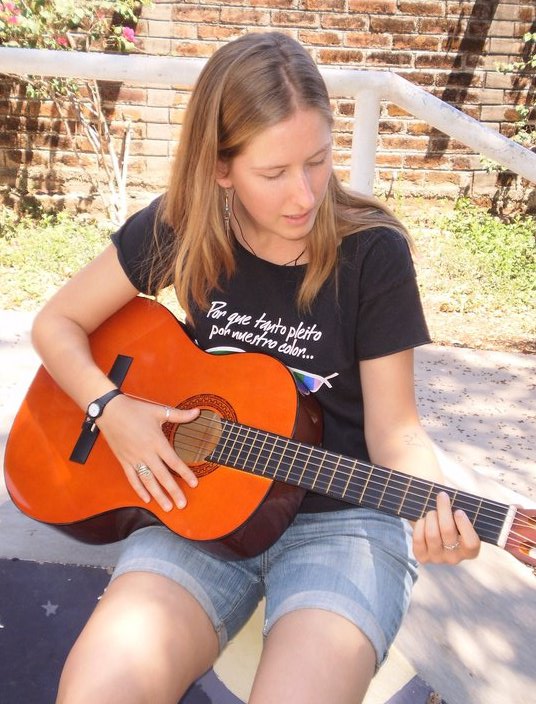Everyone in the community of Nueva Esperanza knew exactly what type of plant gave me the second degree burn on my leg. Apparently, it's called "pan caliente" (hot bread).
Nueva Esperanza is a community of 100+ families (in around 500 people total) in the Bajo Lempa region of El Salvador. The vast majority of the residents (and all of the founders) are survivors of the Rio Sumpul massacre in Chalatenango in 1980. After the massacre, they found a place to take refuge -- the basement of a church in San Salvador (about a two-hour drive on good highways),
an approximately 30' x 30' space with one sink and one toilet -- for 400 people. They gradually added a stove on the roof of the church building and lived there, with the church constantly surrounded by death squads to prevent their leaving, for three years. With the help of two English students, they eventually received permission to leave the country and go to Nicaragua, where they established cooperatives in common with Nicaraguans and lived for another 9 years.
In 1991, they received the right (after a year-long process) to return to Salvador. While their intention to live and own land cooperatively was opposed by the government, they managed to do it. They built houses, ten at a time; they held classes under trees until a school could be built. In the years since, they have built a community infrastructure that includes a clinic, a health emergency fund, a food cooperative (400 hectares of land held in common) and processing plant. Leadership of women and youth is especially encouraged; the president of the community is a woman. (And one hell of a strong one at that.)
[It deserves to be noted that the one-year process to return included a brief time occupying the Salvadoran embassy in Managua -- holding mass, putting on plays, and receiving food from Nicaraguan supporters. Finally the people from neighboring embassies called and put pressure on the Salvadoran government to "let those sons of bitches out -- they make too much noise and we can concentrate."]
Based on the words of the people we met with, as well as the clear message sent by the everyday lives we witnessed, education is clearly the most important element of community life. Probably the biggest point of pride is that they provide transportation so that children from throughout the entire zone (the lower Lempa area) can come to school in their infancy-through-high school education system. (I'll say again, this is a community of more or less 500 people, plus those from surrounding communities.)
That actually leads to the second major emphasis: solidarity/organization. The level of commitment between the small communities in the area is astounding. There are organizations that deal with environmental degradation and the flooding inherent in living in a river valley, youth groups that receive two of the eleven spaces on the community directiva. I can't count how many times I heard this weekend some version of "none of this would be possible without our organization as a community." It was quite inspiring. It also shows through their commitment to using their resources with integrity. They receive a great deal of support from communities in Belgium, Spain, Germany, and Canada and they are intent on using that money well and without any corruption.
The major, unifying theme of the community is the reality of its being a Base Christian Community. The people meet in smaller groups, share the eucharist, and allow their faith to truly guide their decisions and community life. At mass last night, the theme was the banquet of creation. Hearing those stories in the context of a community that truly strives to share the abundance it does have and works hard for it gives them an entirely different meaning. I probably got about 80% of the Spanish, but every once in a while, my mind would wander, touched off by whatever the priest (a Spanish man who has been with the community since about 1995 in Nicaragua) had just said. For some reason, I had never approached the story from the avenue of what keeps people not from being invited but from accepting the invitation. The other priorities that make us think they are more important than attending the banquet.
During communion, Peggy's (our professor) lesson from class last week about the meaning of 'eucharist' as a giving of thanks came to mind combined with others of her words (from a different context): A gift given out of someone's subsistence, rather than their excess, is an entirely different type of gift.
And finally, from class this morning, a pretty amazing poem that gave me chills:
Did the woman say,
When she held him for the first time in the dark of a stable,
After the pain and the bleeding and the crying,
"This is my body, this is my blood"?
Did the woman say,
When she held him for the last time in the dark rain on a hilltop
After the pain and the bleeding and the dying,
"This is my body, this is my blood"?
Well that she said it to him then,
For dry old men,
brocaded robes belying barrenness,
Ordain that she not say it for him now.
--Frances Croake Frank
(This reminds me why I'm so proud of my mom.)
Subscribe to:
Post Comments (Atom)

1 comment:
The poem at the end of this post was awesome - providing me with a personal connection to the eucharist that is helpful to me as I continue to struggle with a "crisis of faith" along my journey. Thanks for that!
I too am proud of your mom - she gave an absolutely great sermon yesterday.
Stella Townsend
Post a Comment